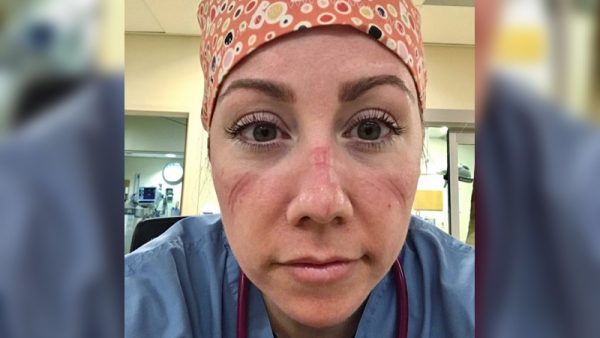
Prior to the outbreak of the corona virus, surgical masks were produced to be worn by health professionals during surgery and certain health care procedures. These surgical masks were produced to reduce the wearer’s exposure to microorganisms shed in liquid droplets and aerosols from the mouth and nose.
However, with the outbreak of the COVID pandemic, ALF staff have been wearing the surgical mask round the clock to protect residents and themselves from getting infected.
As a result of excessive mask-wearing. Images are appearing on social media of ALF staff from all over the world showing their blistered and scarred faces from prolonged wearing of surgical masks. These scars are caused by the high concentration of sweat and friction on the face, resulting in discoloration and irritation bruises on the face.
According to Facialist and Medical Aesthetician Candace Marino, while explaining the effect of wearing a surgical mask for prolonged hours on the face, she said “Any time something puts constant pressure on the skin, you are going to see some sort of breakdown”
The effect of this according to Board-Certified Dermatologist Erum Ilyas, M.D. is that “it is not likely to cause long-term damage, but while these photos are heartbreaking to see, the first thing to remember is that this is not permanent scarring, the inflammation and discoloration are in the superficial layers of the skin and can be easily corrected.”
Symptoms
Dryness/tightness
Tenderness
Itching
Burning/pain
Skin lesions
Body Area Affected by PPE
Nasal bridge
Cheek
Hands
Forehead
Some effective home remedies that can be used by medical practitioners who wear the surgical mask for a long period of time include:
The use of ice blocks on the face during hospital shifts would help reduce inflammation.
Blister products such as blister balms, or hydro-seal blister Band-Aids.
The use of zinc creams 30 minutes before wearing the mask to serve as a barrier.
Auaphor creams, baseline, or Desitin products can be applied on the face after a shift or 30 minutes before wearing the surgical mask.
Medical personnel can also purchase the Clinical Pure Care Collection Kit. The kit comes with a gentle cleanser, two calming, antioxidant serums that help with dry, dehydrated, irritated skin, a hydrating sheald recovery balm, and a zinc-based sunscreen.
Skin products containing azelaic acid can also be used by those experiencing breakouts. Azelaic acid is a naturally-occurring acid derived from barley, wheat and rye are best known for helping with fading dark marks.
Niacinamides like Paula’s Choice Clinical Niacinamide 20% Treatment can also act as anti-inflammatories and soothe breakouts.
Products that will peel or exfoliate the skin should also be avoided as these will peel the skin oil and surface.